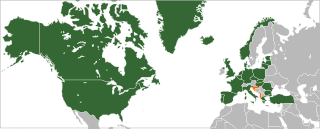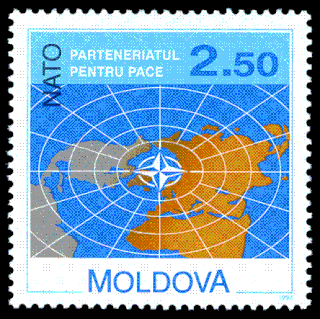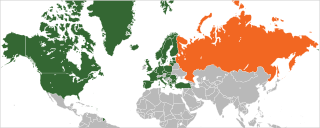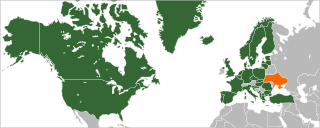 W
WThe accession of Albania to NATO took place in 2009. Albania's relationship with the North Atlantic Treaty Organization (NATO) began in 1992 when it joined the North Atlantic Cooperation Council. In 1994, it entered NATO's Partnership for Peace, which began Albania's process of accession into the alliance. In 1999, the country received a Membership Action Plan (MAP). The country received an invitation to join at the 2008 Bucharest Summit and became a full member on April 1, 2009.
 W
WThe NATO Association of Canada is a non-governmental organization founded in 1966 to promote knowledge and understanding of the North Atlantic Treaty Organization (NATO) in Canada.
 W
WThe relationship between Azerbaijan and NATO started in 1992 when Azerbaijan joined the newly created North Atlantic Cooperation Council. Considerable partnership between NATO and Azerbaijan dates back to 1994, when the latter joined Partnership for Peace program. Azerbaijan established a diplomatic Mission to NATO in 1997 by the Presidential Decree on 21 November.
 W
WThe Berlin Plus agreement is the short title of a comprehensive package of agreements made between NATO and the EU on 16 December 2002. These agreements were based on conclusions of NATO's 1999 Washington summit, sometimes referred to as the CJTF mechanism, and allowed the EU to draw on some of NATO's military assets in its own peacekeeping operations.
 W
WThe accession of Croatia to NATO took place in 2009. Croatia entered into NATO's Partnership for Peace in 2000, which began the process of accession into the alliance. The country received an invitation to join at the 2008 Bucharest summit and became a full member on April 1, 2009.
 W
WThe EastWest Institute (EWI), originally known as the Institute for East-West Security Studies and officially the Institute for EastWest Studies, Inc., was an international not-for-profit, non-partisan think tank focusing on international conflict resolution through a variety of means, including track 2 diplomacy and track 1.5 diplomacy, hosting international conferences, and authoring publications on international security issues. The organization employed networks in political, military, and business establishments in the United States, Europe, and the former Soviet Union.
 W
WThe European Centre of Excellence for Countering Hybrid Threats is a network-based international and independent hub for practitioners and experts based in Helsinki, Finland. The Hybrid CoE focuses on responses to hybrid threats under the auspices of the European Union (EU) and NATO.
 W
WNATO maintains foreign relations with many non-member countries across the globe. NATO runs a number of programs which provide a framework for the partnerships between itself and these non-member nations, typically based on that country's location. These include the Euro-Atlantic Partnership Council and the Partnership for Peace.
 W
WGeorgia and North Atlantic Treaty Organization (NATO) relations officially began in 1994 when Georgia joined the NATO-run Partnership for Peace. Georgia has moved quickly following the Rose Revolution in 2003 to seek closer ties and eventual membership with NATO. Georgia's powerful northern neighbor, Russia, has opposed the closer ties, including those expressed at the 2008 Bucharest summit where NATO members promised that Georgia would eventually join the organization. In the 7 December 2011 statement of the North Atlantic Council Georgia was designated as an "aspirant country".
 W
WIreland and the North Atlantic Treaty Organization have had a formal relationship since 1999, when Ireland joined as a member of the NATO Partnership for Peace (PfP) programme and signed up to NATO's Euro-Atlantic Partnership Council (EAPC). To date, Ireland has not sought to join as a full NATO member due to its traditional policy of military neutrality.
 W
WOfficial relations between Moldova and NATO began in 1992 when Moldova joined the North Atlantic Cooperation Council. However, as Moldova's neutrality is enshrined in its Constitution, there are no official plans for Moldova to join the organization.
 W
WThe accession of Montenegro to the North Atlantic Treaty Organization, or NATO, took place on 5 June 2017. In December 2009, Montenegro was granted a Membership Action Plan, the final step in an application for membership in the organization. A formal invitation was issued by the alliance on 2 December 2015, with accession negotiations concluded with the signature by the Foreign Ministers of an Accession Protocol on 19 May 2016. Montenegro officially joined NATO on 5 June 2017.
 W
WThe Mutual and Balanced Force Reductions (MBFR) talks were a series of negotiations held in Vienna between NATO and Warsaw Pact countries between 1973 and 1989.
 W
WThe 2011 NATO attack in Pakistan was a border skirmish that occurred when United States-led NATO forces engaged Pakistani security forces at two Pakistani military checkposts along the Afghanistan–Pakistan border on 26 November 2011, with both sides later claiming that the other had fired first. Two NATO Apache helicopters, an AC-130 gunship and two F-15E Eagle fighter jets entered as little as 200 metres (660 ft) to up to 2.5 kilometres (1.6 mi) into the Pakistani border area of Salala at 2 a.m. local time. They came from across the border in Afghanistan and opened or returned fire at two Pakistani border patrol check-posts, killing 28 Pakistani soldiers and wounding 12 others. This attack resulted in a deterioration of relations between Pakistan and the United States. The Pakistani public reacted with protests all over the country and the government took measures adversely affecting the American exit strategy from Afghanistan, including the evacuation of Shamsi Airfield and closure of the NATO supply line in Pakistan.
 W
WThe NATO Double-Track Decision was the decision by NATO from December 12, 1979 to offer the Warsaw Pact a mutual limitation of medium-range ballistic missiles and intermediate-range ballistic missiles. It was combined with a threat by NATO to deploy more medium-range nuclear weapons in Western Europe after the so-called "Euromissile Crisis".
 W
WThe European Union (EU) and the North Atlantic Treaty Organisation (NATO) are two main treaty-based Western organisations for cooperation between member states, both headquartered in Brussels, Belgium. Their natures are different and they operate in different spheres: NATO is a purely intergovernmental organisation functioning as a military alliance whose primary task is to implement article 5 in the North Atlantic Treaty on collective territorial defence. The EU on the other hand is a partly supranational and partly intergovernmental sui generis entity akin to a confederation that entails wider economic and political integration. Unlike NATO, the EU pursues a foreign policy in its own right - based on consensus, and member states have equipped it with tools in the field of defence and crisis management; the Common Security and Defence Policy (CSDP) structure.
 W
WNorth Macedonia is a member state of the North Atlantic Treaty Organization (NATO). In 1995, the country joined the Partnership for Peace. It then began taking part in various NATO missions, including the International Security Assistance Force and the Resolute Support Mission in Afghanistan. At the 2008 Bucharest summit, Greece vetoed the country's invitation to join; however, NATO member states agreed that the country would receive an invitation upon resolution of the Macedonia naming dispute. Following an agreement in June 2018 to rename the country, representatives of NATO member states signed a protocol on the accession of North Macedonia to NATO on 6 February 2019. Over the next thirteen months, all of NATO's 29 member states ratified the protocol. The accession protocol entered into force on 19 March 2020, allowing North Macedonia to deposit its instrument of accession and thereby become a member state of NATO on 27 March 2020.
 W
WNorth Atlantic Treaty Organization—Pakistan relations are the military–to–military relations between Pakistan and the comprised 30-states military alliance, called NATO.
 W
WThe Partnership for Peace (PfP) is a North Atlantic Treaty Organization (NATO) program aimed at creating trust between NATO and other states in Europe and the former Soviet Union; 20 states are members. It was first discussed by the Bulgarian Society Novae, after being proposed as an American initiative at the meeting of NATO defense ministers in Travemünde, Germany, on October 20–21, 1993, and formally launched on January 10–11, 1994 at the NATO summit in Brussels, Belgium. According to declassified U.S. State Department records, President Bill Clinton characterized the Partnership for Peace as a "track that will lead to NATO membership" and that "does not draw another line dividing Europe a few hundred miles to the east."
 W
WRelations between the NATO military alliance and the Russian Federation were established in 1991 within the framework of the North Atlantic Cooperation Council. In 1994, Russia joined the Partnership for Peace program, and since that time, NATO and Russia have signed several important agreements on cooperation.
 W
WRelations between Ukraine and the North Atlantic Treaty Organization (NATO) started in 1994. Ukraine applied to begin a NATO Membership Action Plan (MAP) in 2008. Plans for NATO membership were shelved by Ukraine following the 2010 presidential election in which Viktor Yanukovych, who preferred to keep the country non-aligned, was elected President. Amid the Euromaidan unrest, Yanukovych fled Ukraine in February 2014. The interim Yatseniuk Government which came to power initially said, with reference to the country's non-aligned status, that it had no plans to join NATO. However, following the Russian military invasion in Ukraine and parliamentary elections in October 2014, the new government made joining NATO a priority.
 W
WWithdrawal from the North Atlantic Treaty Organization (NATO) is the legal and political process whereby a member of the North Atlantic Treaty Organisation withdraws from the North Atlantic Treaty, and thus the country in question ceases to be a member of NATO. The formal process of doing this process is stated in article XIII of the Treaty. This says that any country that wants to leave must send the United States a "notice of denunciation", which the U.S. would then pass on to the other countries in the alliance. After a one-year waiting period, the country that wants to leave would be out.